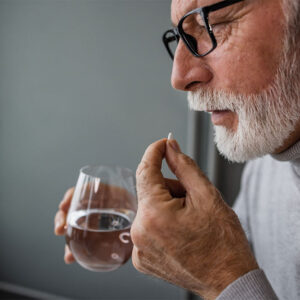
Blacklisted Treatment CURES Cancer
We all have that one in-law, right? You know, the guy you didn’t even want to talk to when you first met him… and now you’ll sort of begrudgingly acknowledge each other at the Thanksgiving table.
Well, for about the past 40 years, that’s exactly how the mainstream cancer industry has treated intravenous vitamin C (IVC).
No matter how many studies show it cures cancer… no matter how many lives are saved or extended… the mainstream still can’t bring itself to make IVC a standard cancer option.
Call me crazy — but I think this has a lot to do with all the truckloads of cash they’re making off of chemo treatments.
But, fortunately for all of us, we may have just taken another baby step in the right direction.
A new (and pretty mainstream) study has shown that IVC can boost the effectiveness of standard cancer treatments.
For this research, IVC was given to patients with glioblastoma who were already undergoing chemo and radiation. They received three infusions per week for two months, and then two infusions per week for seven months.
Glioblastoma is a highly aggressive form of brain cancer, and the typical survival rate is in the 12-14-month range. Adding vitamin C to chemo and radiation extended the survival rate by an additional 4-6 months.
That’s a massive improvement.
Of course, the goal of this study is to keep you on chemo and radiation. But the fact is, there’s lots of science showing that IVC can extend lives — and even cure cancer — all on its own.
Back in the 1970s, one of my heroes in the medical community—Nobel Prize winner Linus Pauling—was the first to make the vitamin C/cancer connection. His research showed that cancer patients given high doses of intravenous vitamin C lived 4 TIMES longer than those who weren’t.
Back then he was called a quack. Today, he’s a pioneer.
Even the National Cancer Institute has admitted that vitamin C can block tumor growth in numerous cancers, including the prostate, pancreatic, liver, colon, and more.
It’s not news to me that IVC can kill cancer. My colleagues have been using it for years, and I’ve seen countless patients benefit from it. Now, the government and the medical community at large are slowly admitting they were wrong about it.
It’s about time.
The reason IVC is so powerful is because it exploits a weakness built into all cancer cells. Cancer cells have a faulty mechanism that causes them to produce a substance called redox active iron molecules. When they come in contact with vitamin C, these molecules form free radicals that destroy the cancer cells.
It’s important to note that the results of these studies occurred with a dosage 1,000 TIMES the recommended daily allowance of vitamin C, and given through an IV. You can’t—and shouldn’t—take that much vitamin C orally because the body can only assimilate so much into the bloodstream at one time.
If you’re interested in finding a doctor who offers IVC, the American College for Advancement in Medicine Physician Finder is a good place to start. You can find it here.
Make some calls to local doctors. If a doctor’s office isn’t offering it, there’s a good chance they’ll know someone who is.
To a brighter day,
Dr. G
Sources
[1] High-dose vitamin C makes cancer treatment more effective, trial shows
[2] High-Dose Vitamin C (PDQ®)–Patient Version
[3] High doses of vitamin C to improve cancer treatment passes human safety trial
[4] Was Linus Pauling Right About Vitamin C’s Curative Powers After All?
Written By Dr. Richard Gerhauser, M.D.
For years he’s been the trusted doctor for celebrities, world-class athletes, and countless seniors looking to reclaim their health.
And now…for the first time ever… he’s making his medical breakthroughs available to readers all across America.
Dr. Richard Gerhauser, M.D. is one of the most pioneering and innovative minds in medicine today – and he delivers cutting-edge cures each month through his Natural Health Response newsletter.
Natural Health Response readers get full access to Dr. Gerhauser’s protocols for chronic pain… heart disease… diabetes… Alzheimer’s… and even cancer. These are the very same treatments Dr. Gerhauser recommends to his own patients at his practice in Tucson, Arizona.
In addition to being a board-certified medical doctor, Dr. Gerhauser has earned two master’s degrees and has served as a clinical professor at the University of Arizona.
And as a physician at the world-famous Canyon Ranch, Dr. Gerhauser treated celebrities from around the world who paid dearly for the type of next-generation health information he provides Natural Health Response readers each month.
View More Free Articles
Mother Nature's Bone-Building Secret REVEALED
Mainstream medicine has peddled the same old song and dance about osteoporosis for years. Pop some calcium pills… do some jumping jacks… and cross your fingers that your bones don’t crumble like a stale cookie. But what if I told you Mother Nature has been hiding a bone-building secret right under our noses? And we […]
The INCREDIBLE Payoff for Delaying Diabetes
If you don’t know where your blood sugar levels stand, it’s time to get them checked. It’s estimated that one in three adults has prediabetes, yet 80 percent of these folks have NO IDEA they’re in this category. That’s a BIG problem because most people will develop type 2 diabetes within just five years of […]
The Biggest Dementia Risk Factor REVEALED
I’m sure you’re familiar with the Skeleton Dance song… “The foot bone is connected to the leg bone. The leg bone is connected to the knee bone…” It’s easy to think of our bones being linked because we can physically see them. What’s less obvious is that everything else about your health is JUST as […]
It's NEVER Too Late to Kick This Dangerous Habit
You’ve heard it a million times before: “Smoking is bad for you.” If you’re still lighting up, I bet you remember a time when smoking wasn’t just accepted—it was downright fashionable. Remember when you could smoke in restaurants, on airplanes, and even in hospitals? Heck, movie stars even made it look cool and sophisticated. Well, […]
The TRUTH About ED No One's Talking About
It’s a subject most men would rather sweep under the rug… erectile dysfunction (ED). But you’re not alone if you’re having trouble in the bedroom. In fact, ED affects up to 30 million men in the U.S. alone. However, popping a little blue pill isn’t the answer. ED drugs are often just slapping a Band-Aid […]
Don’t Let Muscle Loss RUIN Your Golden Years
For older women, muscle mass can take a nosedive after menopause. This means more than trouble carrying in the groceries. Over time, the decline in muscle mass can lead to mobility problems, balance problems, falls, and ultimately a loss of independence. Staying active is a critical piece of the puzzle. But now, researchers have discovered […]
The Bad Habit Causing Lupus
All autoimmune diseases are on the rise—but lupus is one of the worst. When the condition strikes, your immune system starts to attack healthy tissues. Lupus cases have increased by 60 percent in women and have increased six-fold in men over the past four decades. What’s driving this dramatic increase? Well, we might have found […]
SHOCKING Missing Piece of the Diabetes Puzzle Discovered
I’ve been saying for years that there’s MORE to type 2 diabetes than your weight—or even your diet. Sure, they play their part. But unless you’re adding in THIS missing piece of the puzzle, you could be increasing your risk of type 2 diabetes despite your best efforts to avoid it. And you’ll never guess […]
Ditch the Chips and DEFY Aging
Sometimes, you just want something to crunch on. The craving can send even the most health-conscious among us heading straight to the snack aisle. But before you reach for the potato chips—which can contain all kinds of harmful ingredients—I have a better idea. Try THIS crunchy, healthy snack instead of loading up ingredients that can […]
Is Aspirin DEADLY? (Get the Truth Here)
Old habits die hard… especially when we’ve been led to believe they’re good ones. We were told for years that taking an aspirin a day would lower the risk of heart attack and stroke. But for many, those were empty promises that came with a LOT of risk… and LITTLE reward. That’s why, if you’re […]










